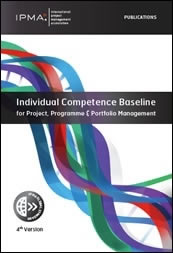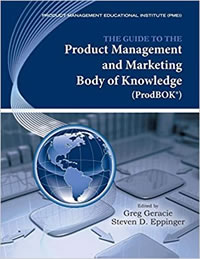Learning PM Success Secrets From Product Managers: In the early 1990s, a corporate executive and I were talking about the talent in his organization, and he asked me a question: “What’s the difference between a project manager and a product manager?” I knew he had his own answer already, so I asked him: “I can think of a dozen differences, but what do you think is the difference?”
He replied, “The Product Manager has a personality.”
I was shocked. As a practicing project manager and consultant, his reply stung. But then, this company was a major Aerospace/Defense contractor. And, despite the soft skill initiatives of the 1980s, some legacy Project Engineers were still not known for their interpersonal skills. But to make such a blanket statement? Even by 1990, I had had worked with thousands of project managers having great interpersonal skills—and personality galore!
 A Product BOK
A Product BOK
I was reminded of this discussion several years ago, when PM Consultant Gary Heerkens contacted me. He suggested that I should assist in a new initiative, to develop a Product Management Body of Knowledge. Gary put me in touch with Greg Geracie, who had completed a useful and popular book, Take Charge Product Management). Now, Greg was working with a professional Product Management organization on a Body of Knowledge project.
Gary, Frank Salidis, Lee Lambert and other “great minds” in the pm community made significant contributions. I reviewed their results, as a technical editor. They did a great job of bridging the gaps and overlaps between pm and pdm. The end result, The Guide to the Product Management and Marketing Body of Knowledge (ProdBOK®). The book went to press in 2013, and is available at a reasonable price at Amazon.com and other booksellers.
Of course, this useful book is not all about Project Management. PM is covered in this book as a way for Product Managers and Marketing managers to interact more effectively. And, the book helps each party understand the strengths all can bring to any initiative. The ProdBOK goes beyond relationships, to include processes, terminology and life cycles (sadly missing in most pm standards). It is also a rich resource for project managers who wish to be more effective, especially in new product development (NPD) initiatives. Why do we say this? Read on.
PM’s Rising Star in Silicon Valley
An article in the October 2013 Fortune magazine intrigued me, The article claimed that today’s PM is the rising star role in Silicon Valley. That the PM role is a stairstep to the executive suite. Gee, only the most-effective organizations I’ve worked with have understood that! Then I was horrified to find that the author was not talking about project managers at all. No, they were highlighting product managers! Much of the article’s testimony echoed the sentiment of the executive in that first sentence above.
Here’s what is wrong with this picture: Product managers leverage their marketing savvy, business strategy and interpersonal skills. They combine them with increased rigor and improved results. However, the project manager role, for too many, has gone in the opposite direction over the past 30 years. Even in the 1980s, selling “soft side” pm workshops was difficult in most companies and government units. But for strange reasons, too many in our practice have gotten further away from the effectiveness factors. Meanwhile, product managers more adeptly harness them.
We have observed, in other articles, “the dumbing down of project management.” Practitioners appear to be moving away from being the competent and performing change agents. No longer leading incredibly successful teams to business success. We have lamented trainings that merely prepare people to pass an exam—not to improve performance. Lightweight certifications that ignore the factors that are responsible for 90% of project success. Essentially, stripping unwary pms of the success factors that executives demand.
PM Success Secrets: Turning the Corner
Of course, some professional organizations, such as IPMA, the International Project Management Association, know better. So does its member nations. They, have always understood the crucial role of these “soft” factors. In our practice, we have emphasized Contextual Skills (business savvy) and Behavioral Skills (interpersonal skills), for decades. And we have seen the results, in project success, business achievement, education and training effectiveness.
 And now others are also realizing that project and business success don’t come from tested knowledge about technical processes. The conversion by the rest of the profession has recently accelerated with a “talent triangle.” This is a clear admission that IPMA has had it right all along. The IPMA Competence Baseline (see the version 4 cover at right) has always contained that triangle; we built this insight in the mid 1990s.
And now others are also realizing that project and business success don’t come from tested knowledge about technical processes. The conversion by the rest of the profession has recently accelerated with a “talent triangle.” This is a clear admission that IPMA has had it right all along. The IPMA Competence Baseline (see the version 4 cover at right) has always contained that triangle; we built this insight in the mid 1990s.
The next action for others will be to move beyond merely testing knowledge, to assess demonstrated competence. We see the signs of that next movement already, as we are much more frequently hearing the word “capability.” For most, that is a word that relates to demonstrated competence, performance, and business results. Of course, the IPMA Member Nations have been demonstrating those key success factors—and improving business success with projects, for decades!
To summarize Learning PM Success Secrets From Product Managers: Most of us continue to emphasize the aspects of our discipline that contribute most to project and business success. At the same time, we can learn new insights from our product management associates. We will learn to more often–yet cautiously–trumpet our successes–one of our most important gaps, as a profession or practice. Then we will eventually impress, and even gain the confidence of, those corporate executives—such as the one in my first sentence, above. After all, effective project managers are the change agents that implement and achieve our executives’ visions for success.

 A Product BOK
A Product BOK